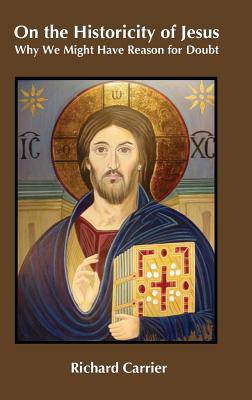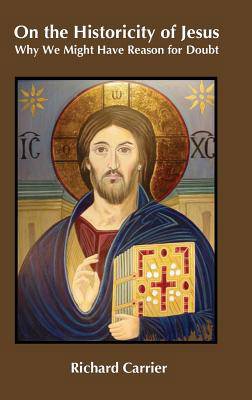
Je cadeautjes zeker op tijd in huis hebben voor de feestdagen? Kom langs in onze winkels en vind het perfecte geschenk!
- Afhalen na 1 uur in een winkel met voorraad
- Gratis thuislevering in België vanaf € 30
- Ruim aanbod met 7 miljoen producten
Je cadeautjes zeker op tijd in huis hebben voor de feestdagen? Kom langs in onze winkels en vind het perfecte geschenk!
- Afhalen na 1 uur in een winkel met voorraad
- Gratis thuislevering in België vanaf € 30
- Ruim aanbod met 7 miljoen producten
Zoeken
€ 83,95
+ 167 punten
Uitvoering
Omschrijving
The assumption that Jesus existed as a historical person has occasionally been questioned in the course of the last hundred years or so, but any doubts that have been raised have usually been put to rest in favor of imagining a blend of the historical, the mythical and the theological in the surviving records of Jesus. Carrier re-examines the whole question and finds compelling reasons to suspect the more daring assumption is correct. He lays out extensive research on the evidence for Jesus and the origins of Christianity and poses the key questions that must now be answered if the historicity of Jesus is to survive as a dominant paradigm. Carrier contrasts the most credible reconstruction of a historical Jesus with the most credible theory of Christian origins if a historical Jesus did not exist. Such a theory would posit that the Jesus figure was originally conceived of as a celestial being known only through private revelations and hidden messages in scripture; then stories placing this being in earth history were crafted to communicate the claims of the gospel allegorically; such stories eventually came to be believed or promoted in the struggle for control of the Christian churches that survived the tribulations of the first century. Carrier finds the latter theory more credible than has been previously imagined. He explains why it offers a better explanation for all the disparate evidence surviving from the first two centuries of the Christian era. He argues that we need a more careful and robust theory of cultural syncretism between Jewish theology and politics of the second-temple period and the most popular features of pagan religion and philosophy of the time. For anyone intent on defending a historical Jesus, this is the book to challenge.
Specificaties
Betrokkenen
- Auteur(s):
- Uitgeverij:
Inhoud
- Aantal bladzijden:
- 712
- Taal:
- Engels
Eigenschappen
- Productcode (EAN):
- 9781909697355
- Verschijningsdatum:
- 3/06/2014
- Uitvoering:
- Hardcover
- Formaat:
- Genaaid
- Afmetingen:
- 156 mm x 234 mm
- Gewicht:
- 1165 g

Alleen bij Standaard Boekhandel
+ 167 punten op je klantenkaart van Standaard Boekhandel
Beoordelingen
We publiceren alleen reviews die voldoen aan de voorwaarden voor reviews. Bekijk onze voorwaarden voor reviews.









